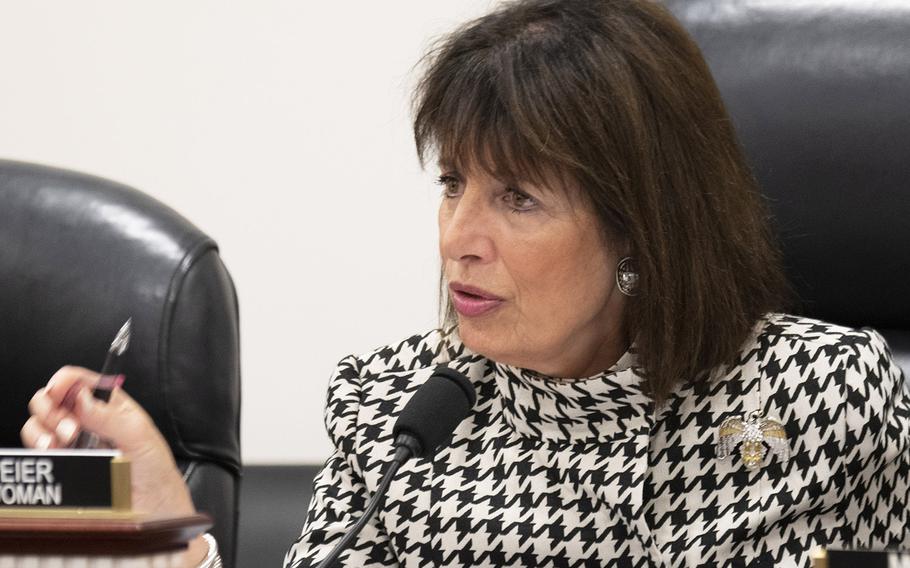WASHINGTON — Two congressional lawmakers are urging the Pentagon to approve requests from transgender veterans to change their name on a key discharge document within 90 days, as some wait up to 18 months for approval due to inefficient processes.
Rep. Jackie Speier, D-Calif., and Sen. Kirsten Gillibrand, D-N.Y., wrote in a letter Monday to Defense Secretary Lloyd Austin that veterans who transition after serving can be especially vulnerable to discrimination if the name on their DD-214 — a document that verifies a service member's proof of service — does not match their current legal name.
“This may lead to a demoralizing experience, or open the door to discrimination, if a veteran is put in the position of explaining to a potential new employer why the name on their military records is not aligned with their current name and gender,” the lawmakers wrote.
Only some of the services have expedited procedures for military record corrections and review, the lawmakers write. The Air Force and Navy do not require an “advisory opinion,” or input from additional board staff members before the cases head to the full board, which has caused shorter wait times compared to the other branches that do require it.
For example, the Board of Corrections of Naval Records averages less than five months from request to completion for these changes, whereas the Army Review Board Agency averages 18 months, the lawmakers wrote.
“The Army’s goal is to get to an average of 10 months, but that is still simply too long for such a routine action, especially when other government agencies are able to update records in weeks, using simple and streamlined processes with clear documentation requirements,” the lawmakers wrote.
The Army said some applications have been delayed further because the coronavirus pandemic shuttered the National Personnel Records Center. About 40 cases are pending completion, said Lt. Col. Junel Jeffrey, an Army spokeswoman.
“We are focusing specific attention on completing those [cases] as quickly as possible,” she said.
Jeffrey said the Army Review Boards Agency expects all DD-214 name-change requests will soon be adjudicated within 10 months.
Advocates said some transgender veterans have waited more than two years, including Sue Robbins, a 20-year transgender Army veteran who sits on Equality Utah’s Transgender Advisory Council, which works to advise the state's top LGBTQ civil rights and advocacy organization on issues facing the Utah transgender community.
Robbins, a 60-year-old government contractor, said she applied to change her name on her DD-214 in 2016 and it took slightly more than two years to be approved. She is not certain what caused the delay.
Advocates said many transgender veterans are forced to come out repeatedly if they have outdated records that don’t align with other legal documents.
“The goal is to be able to have all the legal paperwork proper, so that way we don't have to be outed when we produce paperwork. We can just show that DD-214 … then we just move on with that effort instead of getting into this long discussion about why we're transgender or whether a person may not approve of what I've done,” Robbins said.
That long discussion — one that Robbins calls “tedious and tiring” — can cause negative health impacts and harmful outcomes depending on the situation.
“You never know who you're coming out to [or] how they feel about the transgender community. So then you open yourself up to discrimination in places where that can cause real harm,” Robbins said.
Jennifer Dane, executive director of the Modern Military Association of America, said a veteran who she is working with was denied a home loan because the person was waiting to get their record corrected and their names did not align on paperwork.
In general, transgender and gender nonconforming people are at risk of discrimination in schools, workplaces, doctor’s offices and emergency rooms at the hands of police officers, health care providers and landlords, according to a report from the National Center for Transgender Equality and the National Gay and Lesbian Task Force that surveyed just less than 6,500 individuals.
Nearly one in five of all survey respondents reported being refused medical care outright because they were transgender or gender nonconforming, according to the report.
Speier and Gillibrand thanked Austin for his support of President Joe Biden’s move to reverse the ban on transgender people serving in the military implemented during the administration of former President Donald Trump. Yet, inclusive policies must apply to transgender veterans too.
“We cannot forget about the service of transgender veterans who have served honorably and ask that they be afforded the recognition and respect they deserve,” they wrote.
Speier and Gillibrand want the Pentagon to work with the service secretaries to ensure that name change requests will happen within 90 days if a veteran’s records are digitally available.
“These straightforward cases should not carry the administrative burden of full board consideration and associated lengthy timeline. We owe it to veterans not to drag out injustice,” they wrote.
The lawmakers asked Austin to reply to the letter to share whether their timeline is feasible and whether any other action must be taken to expedite the requests.
Twitter: @sarahjcamm

Chairwoman Rep. Jackie Speier, D-Calif., asks a question during a House Armed Services subcommittee hearing on the Exceptional Family Member Program, Feb. 5, 2020, on Capitol Hill. (Joe Gromelski/Stars and Stripes)